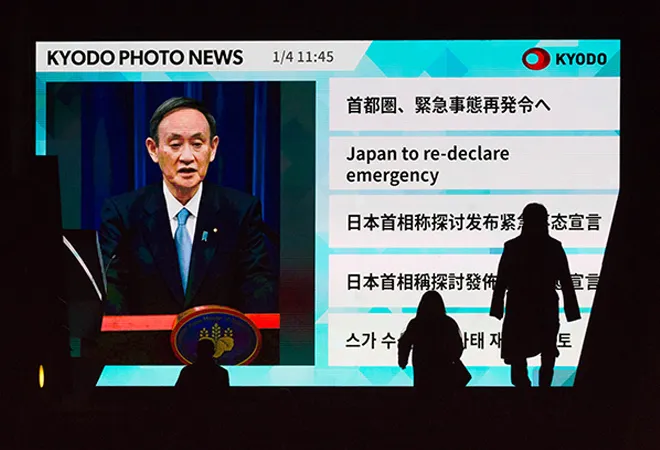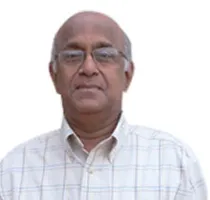-
CENTRES
Progammes & Centres
Location
As the COVID-19 pandemic gets more complicated, Prime Minister Suga finds himself in a difficult dilemma struggling to strike a practical balance between the needs of the country’s economy and the demands of public health.

Japanese Prime Minister, Yoshihide Suga, has completed more than one hundred days in office. Public opinion at home is sharply divided on his administration. He started off well in September with about 70% approval ratings in opinion polls. But, in recent weeks, several opinion surveys conducted by different media agencies have shown his popularity plummeting to about 40% amid the “third wave” of COVID-19 cases in the country. Large sections of the Japanese people believe that his management of the raging pandemic has been very slow and disappointing.
One of the most serious constraints PM Suga faces is that his tenure as party president is only for one year, which ends in September 2021. It means that he has only nine months before him now and he has to build up his image as an effective leader with significant achievements to demonstrate to the Japanese electorate.
To be sure, in his first major policy speech at the Japanese Diet, he underlined his determination to change the rigid administrative structures by introducing reforms. He also stressed the importance of introducing digitalisation on a large scale and eliminating some of the outmoded practices like the Hanko seal system altogether. Having decided to establish a central agency for degitalisation, he appointed senior party leader, Taro Kono, to be in charge of administrative reforms. He also assured that he would revamp the national economy by carrying out the third arrow of his predecessor’s Abenomics strategy.
Though, by his own admission, foreign policy is not his forte, his initial moves have underscored his strong intent to continue the policies pursued by his predecessor Abe. He emphasised the importance of his ‘free and open Indo-Pacific’ vision by hosting the second ministerial meeting of the foreign ministers of the four QUAD countries in Tokyo. As part of boosting the “FOIP Vision,” he made his first official foreign visit to Vietnam and Indonesia and impressed upon the ASEAN leaders the need to move in the direction of creating an open and rules-based Indo-Pacific region.
Unlike most of his predecessors, PM Suga could not make the customary visit to the United States due to COVID-19 and the Presidential election. But he is now making preparations to visit Washington in February this year. What approach the new Democratic administration will adopt towards China is a subject of great interest for Tokyo. In recent weeks, one could see evidence of Beijing showing interest in improving its relations with Japan. Many Chinese believe that establishing good equations with Tokyo at this juncture would be useful in dealing with the new Biden administration. Chinese Foreign Minister Wang Yi visited Tokyo in the last week of November last year with an idea to improve relations with the Suga administration. Wang succeeded in signing an agreement for renewing exchanges of visits by the businesspeople on both sides. Both countries also agreed that a high-power Japanese economic delegation would visit China this year to map out their plans for the future.
While Prime Minister Suga, like Abe, is interested in keeping the bilateral ties stable, he will continue to maintain a delicate balance in Japan’s relations with the US and China. It is important to note that Suga in his meeting with Wang raised his concerns about the increasing number of intrusions by the Chinese naval vessels in Japanese territorial waters around the Senkaku islands. But far from seeking to assuage the Japanese leader, Wang asserted China’s claim to the Islands.
Considering President-elect Joe Biden’s categorical reiteration of American support to Japan’s position on the issue, there is little likelihood of a quick easing of tensions in Sino-Japanese relations. Significantly. the Japanese government did not raise the question of President Xi Jinping’s visit to Japan that was postponed in the month of April due to COVID-19.
But what is posing the biggest challenge to PM Suga is the increasing surge of coronavirus cases in the country, which is witnessing what is now described as the “third wave” of the virus. The current surge is even worse than the earlier two waves witnessed during April and August. At the time of his assumption of office, the COVID-19 situation seemed to be under control, but a fresh wave started soon in October. This was followed by Suga strongly supporting a massive plan to encourage domestic travel to propel the national economy. He vigorously pursued the scheme called ‘Go To Travel’ by extending liberal subsidies that also provided travel, accommodation and food facilities. The scheme started in July during Abe’s time with as Chief Cabinet Secretary, who was then a staunch supporter of the programme. After succeeding Abe, he continued to spearhead the scheme in order to boost the economy.
As the scheme picked up momentum, it also contributed to the spread of virus infections across the country. Many in his own party were dismayed that Suga was not effectively addressing the pandemic crisis by giving greater priority to economic recovery than to public health. Public criticisms of his “Go To Travel” scheme were getting stronger as shown in his declining popularity in several opinion surveys. Even many of the country’s top medical experts and institutions advised the government to suspend the travel scheme.
The third wave of the virus started in the month of October and the many densely populated areas in prefectures like Tokyo, Osaka, Aichi, Hyogo Chiba, Saitama, Kanagawa and Hokkaido have registered unprecedented surges in infection cases, giving rise to the possibility of declaring emergency again. The government set a three-week timeline from the last week of November to curb the spread of the pandemic. On 14 December, Suga admitted that his efforts to boost the economy while simultaneously attempting to curb the virus had hit a wall.
Realising that the surge had not abated, PM Suga announced a major shift in his policy by stating that the travel scheme would be suspended from 26 December until 11 January. Many top Japanese medical experts had advised him against pursuing the travel scheme if he was serious about fighting the pandemic. His decision to suspend the scheme was mainly influenced by political considerations like his diminishing popularity, the increasing opposition from the public and the persistent advice of the experts.
What are the options open to him now? Some people have hinted that he could think of introducing an emergency for a short period as done earlier by Abe. For that he has to work in close cooperation with Prefectural governors and opposition political parties. But PM Suga is not inclined to impose emergency on the people, even though there is a massive surge in the number of infection cases all across the country. In the meantime, he has to wrestle with new issues like the entry of virus variants from the UK which forced the government to temporarily ban the entry of all foreigners into Japan.
As the COVID-19 pandemic is getting more complicated, Suga finds himself in a difficult dilemma struggling to strike a practical balance between the needs of the country’s economy and the demands of public health. It will entail considerable investment of time and resources to find a way out of this dilemma.
Meanwhile, as the time at his disposal is very short, he has to turn his attention to other key questions like holding the postponed summer Olympics in July this year, facing the party presidential election again and choosing the most suitable dates for dissolving the present lower house and holding fresh elections. These are formidable challenges and Suga’s survival will depend on how prudently he addresses them.
The views expressed above belong to the author(s). ORF research and analyses now available on Telegram! Click here to access our curated content — blogs, longforms and interviews.

K.V. Kesavan (1938 2021) was Visiting Distinguished Fellow at ORF. He was one of the leading Indian scholars in the field of Japanese studies. Professor ...
Read More +